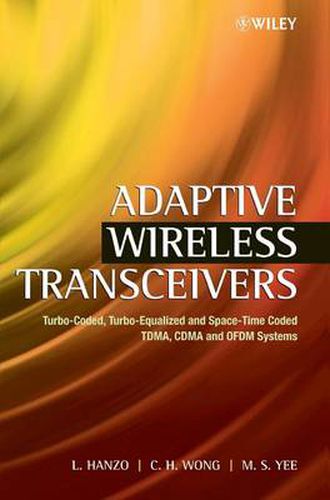Readings Newsletter
Become a Readings Member to make your shopping experience even easier.
Sign in or sign up for free!
You’re not far away from qualifying for FREE standard shipping within Australia
You’ve qualified for FREE standard shipping within Australia
The cart is loading…






Adaptive Wireless Transceivers provides the reader with a broad overview of near-instantaneously adaptive transceivers in the context of TDMA, CDMA and OFDM systems. The adaptive transceivers examined employ powerful turbo codecs, turbo equalisers and space-time codecs, equipping the reader with a future-proof technological road map. It demonstrates that adaptive transceivers are capable of mitigating the channel quality fluctuations of the wireless channel as a lower-complexity alternative to space-time coding. By contrast, if the higher complexity of multiple transmitters and multiple receiver-assisted systems is deemed acceptable, the advantages of adaptability erode. Provides an in-depth introduction to channel equalisers and Kalman filtering and discusses the associated complexity versus performance trade-offs. Introduces wideband near-instantaneously adaptive transceivers and studies their performance both with and without turbo channel coding. Describes how to optimise adaptive modulation mode switching and highlights a range of practical considerations. Introduces neural network based channel equalisers and discusses Radial Basis Function (RBF) assisted equalisers embedded into adaptive modems supported by turbo channel coding and turbo channel equalisation. Employs the above adaptive principles also in the context of CDMA and OFDM transceivers and discusses the pros and cons of space-time coding versus adaptive modulation Researchers, advanced students and practising development engineers working in wireless communications will all find this valuable text an informative read.
$9.00 standard shipping within Australia
FREE standard shipping within Australia for orders over $100.00
Express & International shipping calculated at checkout
Stock availability can be subject to change without notice. We recommend calling the shop or contacting our online team to check availability of low stock items. Please see our Shopping Online page for more details.
Adaptive Wireless Transceivers provides the reader with a broad overview of near-instantaneously adaptive transceivers in the context of TDMA, CDMA and OFDM systems. The adaptive transceivers examined employ powerful turbo codecs, turbo equalisers and space-time codecs, equipping the reader with a future-proof technological road map. It demonstrates that adaptive transceivers are capable of mitigating the channel quality fluctuations of the wireless channel as a lower-complexity alternative to space-time coding. By contrast, if the higher complexity of multiple transmitters and multiple receiver-assisted systems is deemed acceptable, the advantages of adaptability erode. Provides an in-depth introduction to channel equalisers and Kalman filtering and discusses the associated complexity versus performance trade-offs. Introduces wideband near-instantaneously adaptive transceivers and studies their performance both with and without turbo channel coding. Describes how to optimise adaptive modulation mode switching and highlights a range of practical considerations. Introduces neural network based channel equalisers and discusses Radial Basis Function (RBF) assisted equalisers embedded into adaptive modems supported by turbo channel coding and turbo channel equalisation. Employs the above adaptive principles also in the context of CDMA and OFDM transceivers and discusses the pros and cons of space-time coding versus adaptive modulation Researchers, advanced students and practising development engineers working in wireless communications will all find this valuable text an informative read.